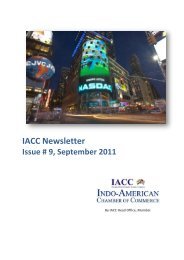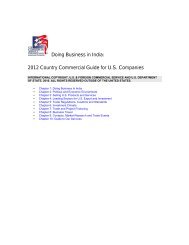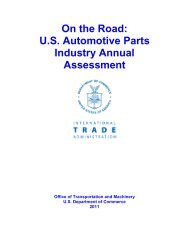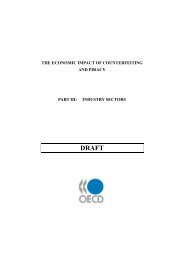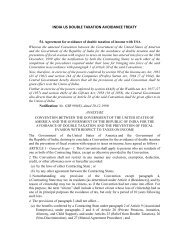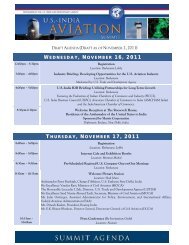Importing into the United States - Indo-American Chamber Of ...
Importing into the United States - Indo-American Chamber Of ...
Importing into the United States - Indo-American Chamber Of ...
You also want an ePaper? Increase the reach of your titles
YUMPU automatically turns print PDFs into web optimized ePapers that Google loves.
SPECIAL REQUIREMENTS<br />
37. PROHIBITIONS, RESTRICTIONS,<br />
OTHER AGENCY REQUIREMENTS<br />
The importation of certain classes of merchandise<br />
may be prohibited or restricted to<br />
protect <strong>the</strong> economy and security of <strong>the</strong> <strong>United</strong><br />
<strong>States</strong>, to safeguard consumer health and<br />
well-being, and to preserve domestic plant and<br />
animal life. Some commodities are also subject<br />
to an import quota or a restraint under bilateral<br />
trade agreements and arrangements.<br />
Many of <strong>the</strong>se prohibitions and restrictions<br />
on importations are subject, in addition to Customs<br />
requirements, to <strong>the</strong> laws and regulations<br />
administered by o<strong>the</strong>r <strong>United</strong> <strong>States</strong> government<br />
agencies with which Customs cooperates<br />
in enforcement. These laws and regulations<br />
may, for example, prohibit entry; limit entry to<br />
certain ports; restrict routing, storage, or use; or<br />
require treatment, labeling, or processing as a<br />
condition of release. Customs clearance is given<br />
only if <strong>the</strong>se various additional requirements<br />
are met. This applies to all types of importations,<br />
including those made by mail and those<br />
placed in foreign trade zones.<br />
The foreign exporter should make certain<br />
that <strong>the</strong> <strong>United</strong> <strong>States</strong> importer has provided<br />
proper information to (1) permit <strong>the</strong> submission<br />
of necessary information concerning<br />
packing, labeling, etc., and (2) that necessary<br />
arrangements have been made by <strong>the</strong> importer<br />
for entry of <strong>the</strong> merchandise <strong>into</strong> <strong>the</strong> <strong>United</strong><br />
<strong>States</strong>.<br />
It may be impracticable to list all articles<br />
specifically; however, various classes of articles<br />
are discussed in this chapter. Foreign exporters<br />
and U.S. importers should consult <strong>the</strong> agency<br />
mentioned for detailed information and guidance,<br />
as well as for any changes to <strong>the</strong> laws and<br />
regulations under which <strong>the</strong> commodities are<br />
controlled. Addresses, phone numbers, and<br />
Web sites for <strong>the</strong>se agencies are listed in <strong>the</strong><br />
appendix.<br />
AGRICULTURAL COMMODITIES<br />
1. Cheese, Milk, and Dairy Products. Cheese<br />
and cheese products are subject to requirements<br />
of <strong>the</strong> Food and Drug Administration<br />
and <strong>the</strong> Department of Agriculture. Most<br />
importations of cheese require an import<br />
license and are subject to quotas administered<br />
by <strong>the</strong> Department of Agriculture, Foreign<br />
Agricultural Service, Washington, DC 20250<br />
(see Chapter 39).<br />
The importation of milk and cream is subject<br />
to requirements of <strong>the</strong> Food, Drug and Cosmetic<br />
Act and <strong>the</strong> Import Milk Act. These products<br />
may be imported only by holders of<br />
permits from <strong>the</strong> Department of Health and<br />
Human Services, Food and Drug Administration,<br />
Center for Food Safety and Applied Nutrition,<br />
<strong>Of</strong>fice of Food Labeling (HFS-156), 200<br />
“C” Street NW, Washington, DC 20204; and <strong>the</strong><br />
Department of Agriculture.<br />
2. Fruits, Vegetables, and Nuts. Certain agricultural<br />
commodities (including fresh tomatoes,<br />
avocados, mangoes, limes, oranges, grapefruit,<br />
green peppers, Irish potatoes, cucumbers,<br />
eggplants, dry onions, walnuts and filberts,<br />
processed dates, prunes, raisins, and olives in<br />
tins) must meet <strong>United</strong> <strong>States</strong> import requirements<br />
relating to grade, size, quality, and maturity<br />
(7 U.S.C. 608(e)). These commodities are<br />
inspected and an inspection certificate must be<br />
issued by <strong>the</strong> Food Safety and Inspection Service<br />
of <strong>the</strong> Department of Agriculture to indicate<br />
import compliance. Inquiries on general<br />
requirements should be made to <strong>the</strong> Agricultural<br />
Marketing Service of <strong>the</strong> Department of<br />
Agriculture, Washington, DC 20250. Additional<br />
restrictions may be imposed by <strong>the</strong> Animal and<br />
Plant Health Inspection Service of that department,<br />
Washington, DC 20782, under <strong>the</strong> Plant<br />
Quarantine Act, and by <strong>the</strong> Food and Drug<br />
Administration, Division of Import Operations<br />
IMPORTING INTO THE UNITED STATES<br />
71







